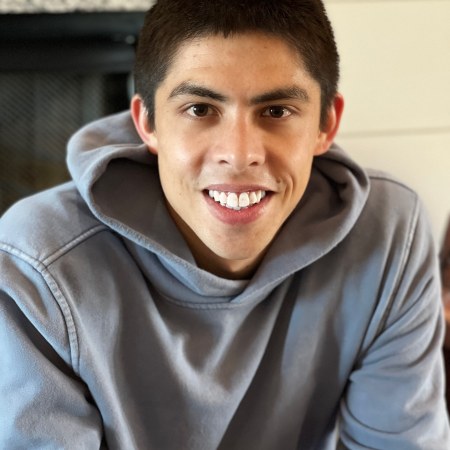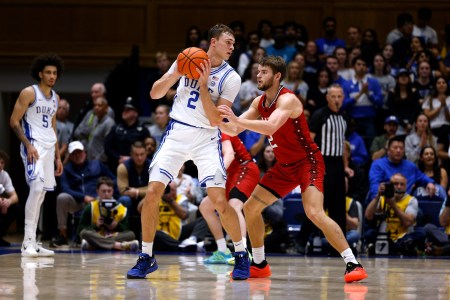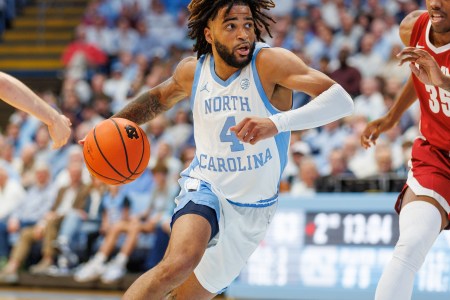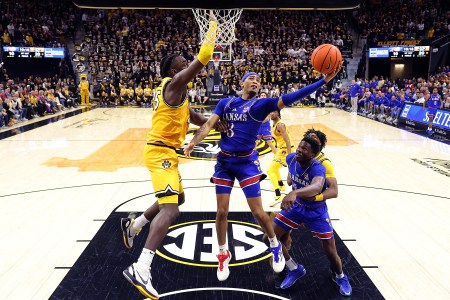Mike Gminski was driving to his son’s football game in 2017 when his phone rang. It was Kenny Dennard, his former Duke teammate. The two have kept in close touch through the years, along with many other members of the esteemed late 1970s Blue Devils. This particular conversation, however, was not one that Gminski was interested in having.
With support from the NBA, Dennard had arranged for Gminski, who was dealing with an intensifying drinking problem, to enter a rehab facility. Now Dennard just had to convince his friend to accept help.
But Gminski wasn’t ready to do that. In fact, he was livid at Dennard for attempting to intervene. “I went ballistic, dropping F bomb after F bomb on him,” Gminski says. “They had everything in place. All I had to do was say yes.” Instead, he cursed and screamed at Dennard before hanging up on him.
While the conversation did not produce the result Dennard had hoped for, Gminski considers it a pivotal moment on his path to recovery. For the first time, he admitted aloud that he had a problem, albeit with the caveat that he alone could fix it. “There’s a saying that ‘Once you say you know, you can’t say you don’t know,’” Gminski says. “And articulating that you have a problem is a huge part of that.”
Still, that day is difficult for Dennard to discuss, even all these years later. “I don’t like to even think about it,” he says, “because it wasn’t him.”
No, it wasn’t the Mike Gminski he knew from Duke, a three-time All-American and one of the best centers in the country. But it also wasn’t the Mike Gminski of today, who is more than four years sober and preparing for the inaugural Mike Gminski Classic, a high school basketball showcase that proudly bears his name. The Classic, which is being organized by Phenom Hoops and Sports Mode One, will take place in the Charlotte Metro area this coming weekend and feature some of the top teams in North Carolina. It will also give Gminski a platform to share his story further and spread awareness about the dangers of alcoholism. A portion of the proceeds will go to The Emerald School of Excellence, North Carolina’s first Recovery High School, and For Students, a non-profit that prepares students to become resilient and healthy adults.
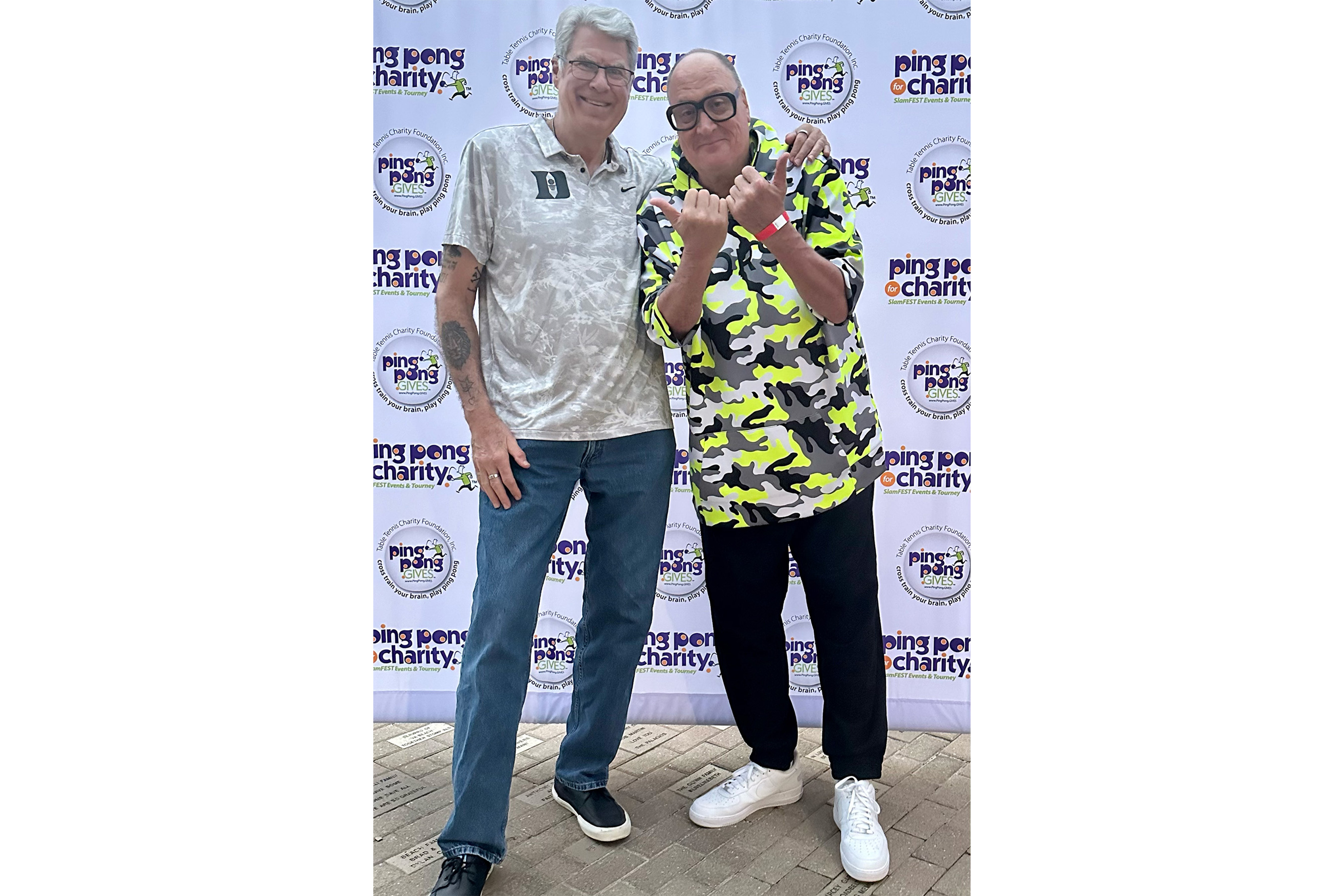
After overcoming his own addiction. Gminski is now working to ensure that others don’t venture down a similar path. “The difference between four or five years ago to now is night and day,” Noah Gminski, Mike’s son, says about his dad’s journey. “For a while, it got hard to see which path he was going to choose. They say when you’re in active addiction, there are three roads: You can either end up in jail, dead or in rehab. He picked the only one of those that allows you to be a free, alive human being. And he’s flourishing more than I’ve ever seen.”
Reclassification is normal in the modern era of high school basketball, but it was unprecedented in the mid-1970s when Gminski graduated from Masuk in Connecticut early to play at Duke. In doing so, he paved the way for many of today’s top-ranked prospects, including AJ Dybantsa and Cooper Flagg, both of whom reclassified.
When Gminski arrived in Durham in 1976, Duke had not made the NCAA Tournament in a decade. A team centered around him, Dennard, Jim Spanarkel and Gene Banks and coached by Bill Foster helped to turn the program around. Gminski — or “G Man,” as he became known — was a 6-foot-11, highly skilled big who dominated on the low post. He won ACC Rookie of the Year in 1977, averaging 15.3 points and 10.7 rebounds. In his sophomore campaign, the Blue Devils went on a remarkable run to the national championship game, where they fell just short to Kentucky. Gminski was the major reason his squad made it there in the first place, scoring 29 points on 13 of 17 shooting in the semifinal against Notre Dame.
The following season, Gminski won ACC Player of the Year and was a first team All-American. As a senior, he guided the Blue Devils back to the Elite Eight, earning NCAA Tournament All-Region honors. He graduated as Duke’s all-time leader in points, rebounds and blocks and still ranks in the top 10 in the ACC in points and rebounds. “He was one of the best centers that I’ve ever played with,” Dennard says. “He just had so much skill.”
Drafted seventh overall by the New Jersey Nets in 1980, Gminski spent 14 years in the NBA. His best seasons came alongside Charles Barkley in Philadelphia during the late 1980s, when he averaged 14.9 points and 9 rebounds and started in 239 out of the 240 games he appeared in.
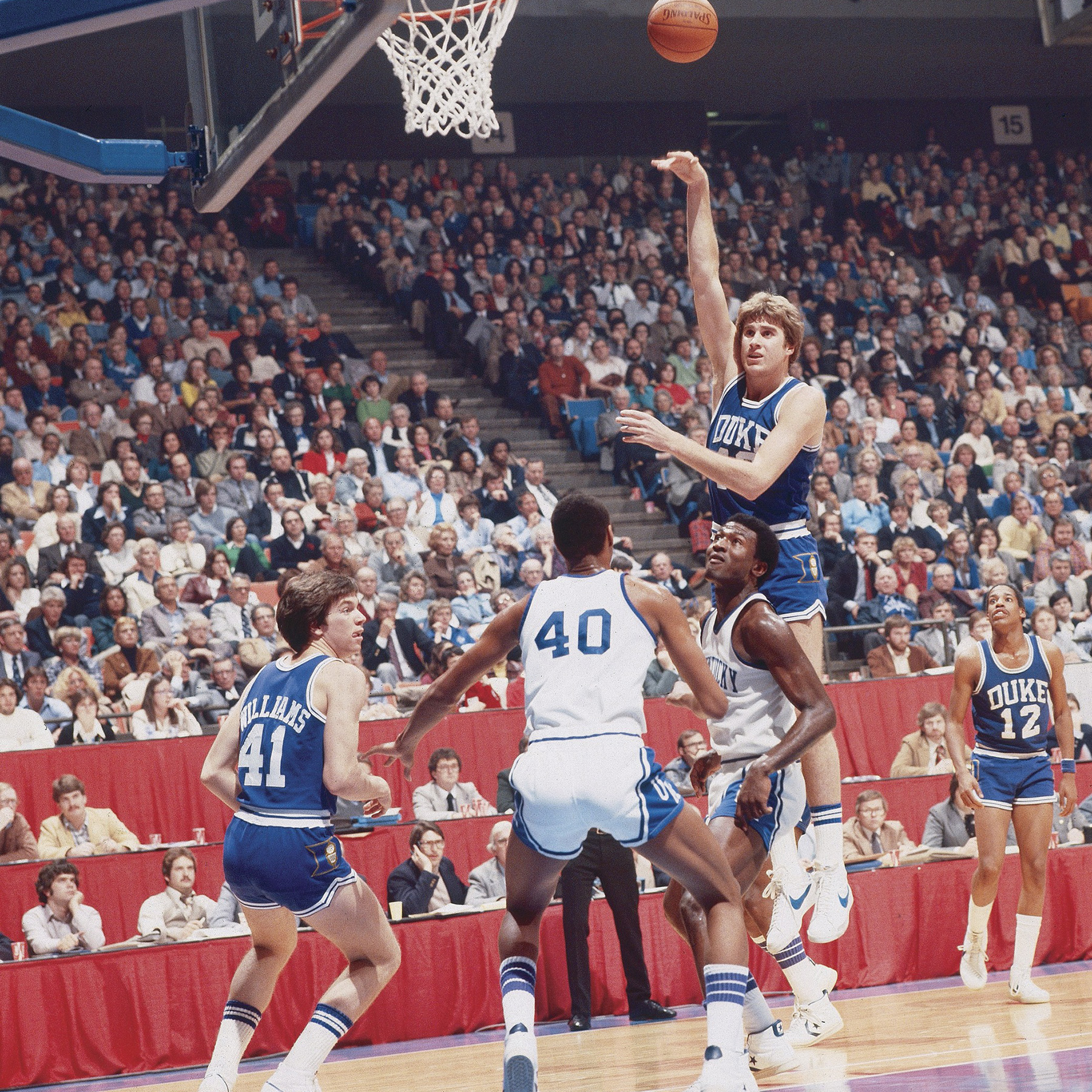
Gminski drank beer on occasion throughout his career, but it never presented a problem on the court, nor in the classroom. (He was also a three-time academic All-American at Duke.) His drinking picked up a bit when he retired in 1994 and transitioned into broadcasting. “Then life showed up in 2000,” he says. “My ex-wife’s business went bankrupt. There was litigation. There was financial ruin. We had a two-year-old son and it put immense pressure on our marriage, which unfortunately didn’t survive that.” Over the next decade, Gminski’s drinking began to accelerate.
As his marriage was ending, Gminski met Sarah Culpepper, with whom he fell madly in love. The two were engaged in 2013 and life was good until an unimaginable tragedy struck. Culpepper suffered from a congenital heart condition and liver issues. On Valentine’s Day in 2015, she had a massive internal hemorrhage that caused her liver to stop clotting her blood. Gminski discovered her unresponsive in their apartment. “She basically died in my arms,” he says. “Every wire in my brain short circuited. Rather than do the smart thing and seek grief counseling or some sort of pastoral care or professional help, I decided that I was going to just drink my way through it.”
Gminski’s family and friends gave him about a “two-year hall pass,” as he put it, to grieve in his way, during which his drinking got increasingly worse. Dennard’s concern rose when he saw Gminski at Bill Foster’s memorial service in 2016. The two went back to the hotel afterwards and Gminski broke down, opening up about Culpepper while simultaneously pounding vodka. “Over the next period of time, every time I saw him, he just seemed a little bit worse,” Dennard says. “Or when I talked to him on the phone, he sounded a little shakier.”
Not long after, Dennard was in touch with the NBA to organize efforts for Gminski to start rehab, which ultimately led to that difficult conversation between the two in 2017. “My ego was still very much in the way,” Gminski says. Rather than accept help, he went dark on everyone. He stopped responding to phone calls and texts and sank further into his addiction.
Gminski was a functional alcoholic, maintaining his position as a college basketball broadcaster but drinking heavily when he wasn’t on the job. As the 2019-20 season unfolded, Gminski knew it would likely be his last calling games. The profession just wasn’t sustainable given his new lifestyle.
Soon after he worked his final game of the year, the pandemic hit. Gminski found himself quarantining at home with nothing to do but drink, from the moment he woke up to the moment he went to sleep. His son, Noah, came to live with him in Charlotte and got a first-hand look at how dire the situation had become. There was even an incident in which Noah had to call the paramedics at 1:30 in the morning because Mike was too intoxicated. While Noah tried to intervene on numerous occasions, the message just wasn’t getting through. “Persistence is key,” Noah says. “I was like, I’m not going to be able to go to sleep at night unless I know I did everything in my power.”
“They say when you’re in active addiction, there are three roads: You can either end up in jail, dead or in rehab. He picked the only one of those that allows you to be a free, alive human being. And he’s flourishing….”
— Noah Gminski, Mike’s son
Mike sought to conceal the severity of his addiction. When the recycling bin was rapidly filling up with evidence, he decided to toss every two or three empty vodka bottles in the woods behind his apartment. Noah eventually found the hidden stockpile. One day, when Mike went out to replenish his supply, Noah brought in all the filthy bottles and organized them on the kitchen table alongside a note that read, “Dad, I love you and I want to help you.” Mike was overcome with emotion upon returning home. He was finally ready to focus on healing. “That really started the process of a number of tearful conversations,” he says, “and [Noah] having an intervention for me on July 10, 2020.”
This time, Gminski got the message. He entered rehab at the Rebound Institute in Lake Worth, Florida, a facility founded by fellow NBA alum Jayson Williams, who had been a teammate of Gminski’s on the 76ers. Before checking into the program, Gminski called loved ones to apologize and tell them what he was doing. “I was so blessed that I didn’t lose anybody,” he says. “I didn’t lose my teammates. I didn’t lose my Duke guys. I didn’t lose any friends. Everybody was so happy that I had taken that step.”
Many of those people, including Dennard, helped raise money for Gminski to spend a second month at Rebound to ensure he fully recovered. Gminski’s commitment to the process was inspiring, especially for Noah, who admits he had been heading down a similar road when it came to his own drinking habits. “Him going through rehab was enough of an eye opener for me where I nipped it in the bud before it got to that point,” says Noah.
Since finishing treatment, Mike has dedicated this next phase of his life to assisting others struggling with addiction. He returned to Rebound for two summers, serving as a mentor to other patients. Back in Charlotte, he is the Director of Mentorship at Sana House, a recovery residence for men 18 and up. He has also been involved with The Emerald School of Excellence, which offers a supportive high school experience for teens in recovery.

The first-ever Mike Gminski Classic is a testament to how far its namesake has come. Gminski sees it as a perfect vehicle to marry his lifelong passion and all the work that he is doing in the recovery space. At some point during the event, he will share his story with the participating players, a couple of whom are ranked in the top 100 in the class of 2025. Gminski was once a high school superstar himself, feeling strong and invincible.
“I had a bulletproof mentality,” he says. “I had massive beliefs in myself and in my abilities. To ask somebody for help was a sign of weakness. And (I thought) that, as my drinking progressed, all that stuff is not going to happen to me, and even if something does happen to me, I’m going to be able to handle it. It is definitely a case of, especially where an athlete or basketball player is concerned, your greatest strength can turn into your biggest enemy.”
That was the case in 2017, when Gminski first turned away Dennard, but it did not stay that way. Gminski ultimately welcomed the support he needed and he is now back to being his true self, only with a new and profound purpose.
“He accepted the grace and he humbled himself and he saw what he needed to see to come to this point,” Dennard says. “And that’s the blessing of it all, because not everybody can do that — not everybody does it. Now we have one of God’s tallest workers here on the planet to help other people.”
